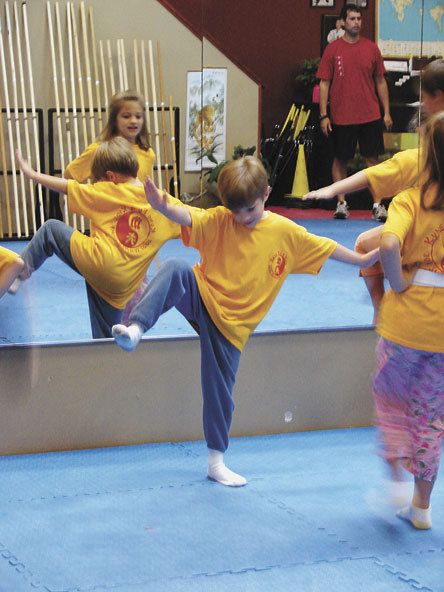While summer is traditionally a time of softball tournaments and pick-up basketball games in the driveway, local studios and organizations offer a variety of martial arts that can be practiced year round to build strength and fitness at any age.
Most of the studios in the Arlington and Marysville area specialize in teaching martial arts that feature striking or kicking, such as karate or taekwondo.
Karate sensei Doug Exum, who is currently taking a personal leave from teaching at his Arlington-based Northwest Karate-do studio, explained that taekwondo has taken off in popularity as a sport. Officially sanctioned as an Olympic sport in 2000, taekwondo is a kicking-oriented sport, often marketed in the United States as karate. Like karate and other arts, taekwondo takes its origins in Asia — specifically, Korea — but has become more widely practiced as a competitive sport than similar arts which can often take a traditional focus, emphasizing the art and origins.
Likewise, the popularity of karate as a sport has soared. Still, there are two schools of thought for those who pursue this Japanese art.
“You primarily have traditonalists and sports people. The traditionalists believe the heart of it should be kept very much in place, the true value of the art is in strengthening your body, mind and spirit to such extent that you can protect yourself, your family or anyone in need of defense,” Exum said.
On the sports side, advocates of karate recently fell short of their bid to see the sport added to the summer Olympic roster in 2012, where it would have joined taekwondo and judo.
Exum described karate as a more whole-body activity than taekwondo and a more effective self-defense preparation.
Further down the philosophical spectrum is kung fu. With origins in China, the phrase kung fu actually refers to an accomplishment or skill acquired through hard work. Likewise, Exum explained, kung fu is as much about mind and spiritual development as athletic development. With origins in the monasteries in China, kung fu places a strong emphasis on teaching morality as well as movements.
“The monasteries and priests all had to have ways to protect themselves, so they all developed some form of conditioning to stay in shape and application where they could protect themselves,” Exum said.
Akin to kung fu and also of Chinese origin is tai chi chuan, often popularly shortened to tai chi. A popular practice among older Americans, tai chi is considered a martial art but rarely taught as such in the United States. Everett Community College instructor Gordy Hallgren, who will lead a tai chi class for the city of Marysville this fall, said that the movements of tai chi are well suited to elderly people who are seeking to build core strength without a lot of strenuous exercise.
His class will focus on “using breathing and posture and motion techniques to enhance circulation and joint quality, particularly with people who are more geriatric,” Hallgren said.
However, even though tai chi is catching on among older Americans, it has plenty to offer students of all ages.
“We put a lot of energy into ch’i kung, which is energy work. It’s exercises that will stimulate circulation,” he said. “Those exercises are good for giving people a sophisticated way to move their body and increase their balance.”
Tai chi shares attributes with yoga, an Indian practice which is widely taught at most gyms and recreation centers, but Exum emphasized that the latter is not considered a martial art.
“Where yoga would work a lot on a mat and just trying to become a semi-human pretzel so to speak, they both deal with breathing and trying to stretch the muscles and avoid injury, calm the mind through mediation,” Hallgren said. “But tai chi does this mainly from a point of standing up.”
Many studios in the Arlington and Marysville area teach more than one form of martial arts. Marysville’s Kung Fu 4 Kids offers kung fu, taekwondo and yoga classes to all ages and Arlington Kickboxing Academy offers more grappling-based martial arts such as judo and Brazilian jujitsu alongside kickboxing and freestyle pankration. But U.S. Taekwondo Academy and ATA Black Belt Academy both instruct primarily in taekwondo, while Family Karate Ronin Dojo and Ancient Arts Karate Academy are also self-descriptive.
Classes are generally offered in the afternoon and evening hours to accommodate work and school schedules. Contact individual studios or organizations for class times and offerings.
“We take all comers. Just have patience and good things will happen,” Hallgren encouraged.



